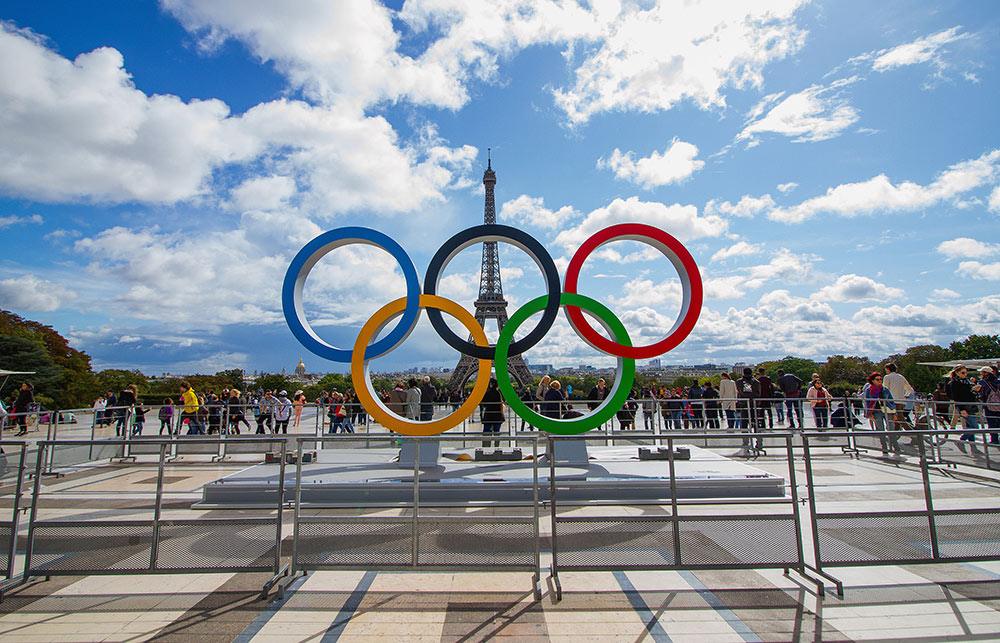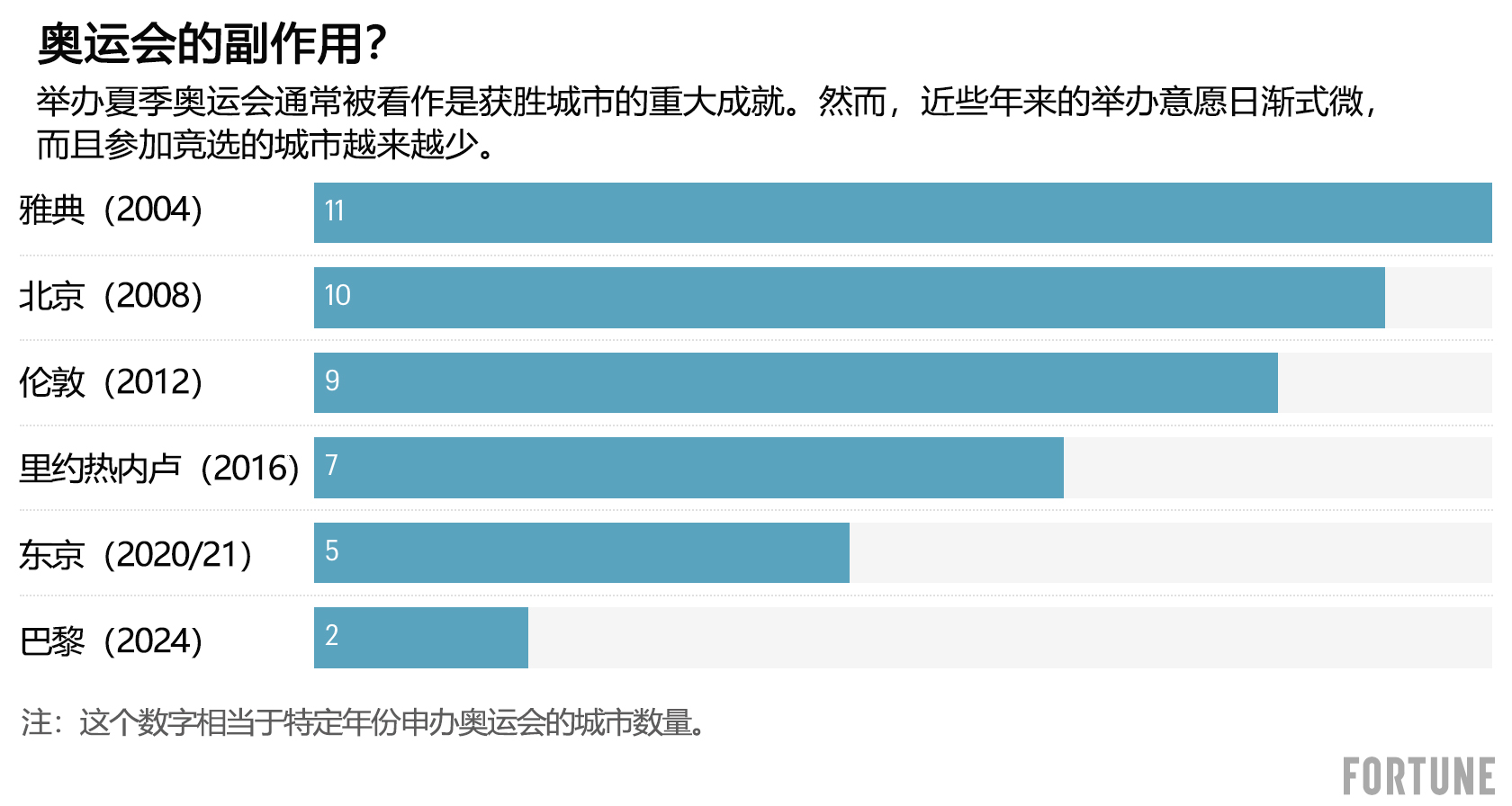2017年9月的一个晚上,巴黎的埃菲尔铁塔上演了绚丽多彩的灯光秀,为的是庆祝巴黎赢得了2024年奥运会的举办权。
与巴黎民众同样感到开心的是国际奥委会的成员们,他们终于松了口气。
对国际奥委会来说,寻找一座愿意而且有能力花费数十亿美元来举办为期两周的体育盛会,并将其看作是一种声誉和荣耀的城市,已经成为了一项艰巨的任务。

随着奥运会赛季在一个世纪以来最糟糕的疫情中拉开帷幕,上述事实如今甚至已经变得更加明显。
日本《朝日新闻》上周末发布的民调显示,有鉴于东京夏季奥运会将于7月23日拉开帷幕,距离现在仅有两个月的时间,约83%的日本民众称,他们希望该活动应该被推迟或干脆取消,这两种意见几乎各占一半。
该国新冠肺炎病例的激增以及缓慢的疫苗接种也促使上万名日本医生向政府请愿取消奥运会,而日本已经在去年推迟了奥运会的举办。数十个日本城市已经撤销了其承接来自于全球各地外国运动员的举措,因为担心奥运会可能会导致新冠肺炎病例的爆炸式增长。即便日本最知名的奥运会新星网球冠军大阪直美,亦发声表达了对未来奥运会的担忧。
然而对奥林匹克官员来说,问题远非疫情那么简单。
在看到举办地不断膨胀的奥运会成本(更不用说此前暴露的一系列奥委会官员性骚扰以及兴奋剂事件)之后,越来越多的城市已经放弃了申办奥运会举办地的想法。
位于英国莱斯特的德蒙福特大学体育历史副教授、奥运会申办专家希瑟·迪希特对《财富》杂志说:“竞选委员会通常会低估成本,而且成本往往会超出很大一部分。人们认为,为什么要把钱花在体育赛事上,而不是基础设施或医疗和教育呢?”
对于越来越多的城市和国家来说,这个问题没有明确的答案。
雅典的教训
曾经举办权的激烈角逐与近些年的情况相比发生了巨大的变化。
20世纪90年代,雅典在与其他10个城市展开激烈竞争之后,赢得了2004年夏季奥运会的举办权。然而,该国的很多民众都对举办奥运会表示后悔,他们认为奥运会是导致希腊灾难性债务危机的罪魁祸首之一。
东京已经在奥运会上花费了约158亿美元,是其2013年在赢得举办权时预算的两倍。
牛津大学的塞德商学院的经济学家本特·弗莱伯格去年向《朝日新闻》透露,事实上,竞选奥运会举办权是“一座城市可能承担的最高级别风险。这种趋势难以为继。”
回想起来,雅典的成本超支似乎拉开了奥运会竞选意愿稳步下滑的序幕。
有10座城市参加了2008年奥运会的申办,北京最终胜出。有9座城市申办了2012年奥运会(于伦敦举行),7座城市申办了2016年奥运会(在里约举行),但只有5座城市曾经申办今年的东京奥运会。
2024年巴黎奥运会呢?仅有两座城市竞争。
在巴黎胜出之前,波士顿、汉堡和布达佩斯均退出了申办,而洛杉矶成为了唯一的竞争对手。与此同时,国际奥委会将2028年奥运会举办权给了洛杉矶,也避免了在短时间内寻找新举办城市的麻烦。国际奥委会正在与澳大利亚的布里斯班协商举办2032年奥运会,避开了以往的公开竞争。

确实,此前的申办暴露了国际奥委会异常准确的一面,因为很长一段时间以来,奥运会都被描述为一个欢聚盛会,象征着全球大团结与和平。
2014年,奥斯陆在2022年冬季奥运会的申办竞选中明显处于领跑地位,挪威曾经赢得过多枚冬季运动会奖牌,而且大多数赛事场地都是现成的。然而,挪威记者揭露了国际奥委会提出的难以置信的需求清单,包括为国际奥委会成员开设私人交通专用道、与挪威国王私下会面,以及酒店房间里的迷你酒吧必须放置大量的可口可乐产品(该公司是奥运会赞助商)。
迪希特以一种难以置信的口吻说:“所有会见室的温度必须始终精确保持在20摄氏度。”
北京最终赢得了2022年冬奥会举办权,此前乌克兰的利沃夫、波兰的克拉科夫和瑞典的斯德哥尔摩都相继退出了竞选。
四年后,加拿大卡尔加里的选民以压倒性的态势反对该市申办2026年冬奥会的提议,而在投票之前,有三座城市退出竞选。最终,米兰拿到了冬奥会举办权,举办地将是繁荣的阿尔卑斯小镇科尔蒂纳丹佩佐。
气势不存
随着越来越多的城市回避申办竞争,国际奥委会似乎失去了一些其过往在协商奥运会举办权时所体现出的气势。迪希特说:“他们无法再主导所有这些曾经让很多申办国望而却步的需求。”
民调显示,法国民众依然支持在巴黎举办2024年奥运会。在巴黎赢得奥运会申办权之后,哈里斯互动公司的民调发现,去年12月,84%的法国民众认为奥运会有助于提升巴黎的旅游吸引力,同时也能够带来急需的工作机会。
巴黎奥委会声称,在38亿欧元的奥运会举办成本中,有97%来自于私人赞助商、门票收入和商品,政府仅需提供1亿欧元的资金。
然而,离奥运会的举办还有三年的时间,人们仍然有大把的时间来积攒对奥运会的怨愤,尤其是当巴黎跟随其前任的步伐,出现预算严重超支问题时。
与卡尔加里居民不同的是,没有人询问巴黎选民,该城市在一开始是否应该申办奥运会。(财富中文网)
译者:冯丰
审校:夏林
2017年9月的一个晚上,巴黎的埃菲尔铁塔上演了绚丽多彩的灯光秀,为的是庆祝巴黎赢得了2024年奥运会的举办权。
与巴黎民众同样感到开心的是国际奥委会的成员们,他们终于松了口气。
对国际奥委会来说,寻找一座愿意而且有能力花费数十亿美元来举办为期两周的体育盛会,并将其看作是一种声誉和荣耀的城市,已经成为了一项艰巨的任务。
随着奥运会赛季在一个世纪以来最糟糕的疫情中拉开帷幕,上述事实如今甚至已经变得更加明显。
日本《朝日新闻》上周末发布的民调显示,有鉴于东京夏季奥运会将于7月23日拉开帷幕,距离现在仅有两个月的时间,约83%的日本民众称,他们希望该活动应该被推迟或干脆取消,这两种意见几乎各占一半。
该国新冠肺炎病例的激增以及缓慢的疫苗接种也促使上万名日本医生向政府请愿取消奥运会,而日本已经在去年推迟了奥运会的举办。数十个日本城市已经撤销了其承接来自于全球各地外国运动员的举措,因为担心奥运会可能会导致新冠肺炎病例的爆炸式增长。即便日本最知名的奥运会新星网球冠军大阪直美,亦发声表达了对未来奥运会的担忧。
然而对奥林匹克官员来说,问题远非疫情那么简单。
在看到举办地不断膨胀的奥运会成本(更不用说此前暴露的一系列奥委会官员性骚扰以及兴奋剂事件)之后,越来越多的城市已经放弃了申办奥运会举办地的想法。
位于英国莱斯特的德蒙福特大学体育历史副教授、奥运会申办专家希瑟·迪希特对《财富》杂志说:“竞选委员会通常会低估成本,而且成本往往会超出很大一部分。人们认为,为什么要把钱花在体育赛事上,而不是基础设施或医疗和教育呢?”
对于越来越多的城市和国家来说,这个问题没有明确的答案。
雅典的教训
曾经举办权的激烈角逐与近些年的情况相比发生了巨大的变化。
20世纪90年代,雅典在与其他10个城市展开激烈竞争之后,赢得了2004年夏季奥运会的举办权。然而,该国的很多民众都对举办奥运会表示后悔,他们认为奥运会是导致希腊灾难性债务危机的罪魁祸首之一。
东京已经在奥运会上花费了约158亿美元,是其2013年在赢得举办权时预算的两倍。
牛津大学的塞德商学院的经济学家本特·弗莱伯格去年向《朝日新闻》透露,事实上,竞选奥运会举办权是“一座城市可能承担的最高级别风险。这种趋势难以为继。”
回想起来,雅典的成本超支似乎拉开了奥运会竞选意愿稳步下滑的序幕。
有10座城市参加了2008年奥运会的申办,北京最终胜出。有9座城市申办了2012年奥运会(于伦敦举行),7座城市申办了2016年奥运会(在里约举行),但只有5座城市曾经申办今年的东京奥运会。
2024年巴黎奥运会呢?仅有两座城市竞争。
在巴黎胜出之前,波士顿、汉堡和布达佩斯均退出了申办,而洛杉矶成为了唯一的竞争对手。与此同时,国际奥委会将2028年奥运会举办权给了洛杉矶,也避免了在短时间内寻找新举办城市的麻烦。国际奥委会正在与澳大利亚的布里斯班协商举办2032年奥运会,避开了以往的公开竞争。
确实,此前的申办暴露了国际奥委会异常准确的一面,因为很长一段时间以来,奥运会都被描述为一个欢聚盛会,象征着全球大团结与和平。
2014年,奥斯陆在2022年冬季奥运会的申办竞选中明显处于领跑地位,挪威曾经赢得过多枚冬季运动会奖牌,而且大多数赛事场地都是现成的。然而,挪威记者揭露了国际奥委会提出的难以置信的需求清单,包括为国际奥委会成员开设私人交通专用道、与挪威国王私下会面,以及酒店房间里的迷你酒吧必须放置大量的可口可乐产品(该公司是奥运会赞助商)。
迪希特以一种难以置信的口吻说:“所有会见室的温度必须始终精确保持在20摄氏度。”
北京最终赢得了2022年冬奥会举办权,此前乌克兰的利沃夫、波兰的克拉科夫和瑞典的斯德哥尔摩都相继退出了竞选。
四年后,加拿大卡尔加里的选民以压倒性的态势反对该市申办2026年冬奥会的提议,而在投票之前,有三座城市退出竞选。最终,米兰拿到了冬奥会举办权,举办地将是繁荣的阿尔卑斯小镇科尔蒂纳丹佩佐。
气势不存
随着越来越多的城市回避申办竞争,国际奥委会似乎失去了一些其过往在协商奥运会举办权时所体现出的气势。迪希特说:“他们无法再主导所有这些曾经让很多申办国望而却步的需求。”
民调显示,法国民众依然支持在巴黎举办2024年奥运会。在巴黎赢得奥运会申办权之后,哈里斯互动公司的民调发现,去年12月,84%的法国民众认为奥运会有助于提升巴黎的旅游吸引力,同时也能够带来急需的工作机会。
巴黎奥委会声称,在38亿欧元的奥运会举办成本中,有97%来自于私人赞助商、门票收入和商品,政府仅需提供1亿欧元的资金。
然而,离奥运会的举办还有三年的时间,人们仍然有大把的时间来积攒对奥运会的怨愤,尤其是当巴黎跟随其前任的步伐,出现预算严重超支问题时。
与卡尔加里居民不同的是,没有人询问巴黎选民,该城市在一开始是否应该申办奥运会。(财富中文网)
译者:冯丰
审校:夏林
One night in September 2017, Paris’s Eiffel Tower lit up with a dazzling multicolored light show—all to celebrate the city winning its bid to host the 2024 Olympics.
Just as joyous, perhaps, was the relief that night, among members of the International Olympics Committee. For the IOC, finding cities willing—and able—to spend billions of dollars to host a two-week sporting bonanza, for the promise of prestige and glamor, has become an Olympian task all of itself.
That fact is even clearer now, as the Olympics season unfolds amid the worst pandemic in a century.
With the Tokyo Summer Games set to open on July 23—just two months away—about 83% of Japanese say they want the event either postponed or cancelled altogether, with the two options about evenly split, according to a poll published last weekend by Asahi Shimbun newspaper. The country’s surge in COVID-19 cases, and its slow vaccine rollout, has also prompted thousands of Japanese doctors to petition the government to scrap the Olympics, which have already been postponed from last year. And dozens of Japanese cities have withdrawn their offers to host foreign athletes arriving from across the world, fearing the Games might result in an explosion of coronavirus cases. Even Japan’s biggest Olympic star, tennis champion Naomi Osaka, has voiced concern about the Games going ahead.
But for Olympics officials, the problems extend far beyond the pandemic.
More and more cities have forgone the idea of vying for the Games, after seeing hosts’ ballooning Olympics costs (not to mention hearing of a string of sex-harassment and doping scandals among Olympic officials). “Bid committees often underestimate the costs, and the costs always overrun by enormous amounts,” Heather Dichter, associate professor of sports history at De Montfort University in Leicester, U.K. and an expert on Olympics bids, tells Fortune. “People think, why is this money being spent on sporting events rather than infrastructure, or health or education?”
For a growing number of cities and countries, there is no obvious answer to that question.
The lesson of Athens
That is a drastic change from recent times. Back in the 1990s, Athens won the bid to host the 2004 Summer Games, after an fierce contest between 11 different cities. But many in the country came to regret the Olympics, which is believed to have partly led to the disastrous Greek debt crisis.
Tokyo has already spent about $15.8 billion on its Olympics, more than double what it budgeted in 2013, when it won the bid. Bidding for the Olympics, in fact, is “the highest level of risk a city can take on,” economist Bent Flyvberg, of Oxford University’s Saïd School of Business, told the A.P. last year. “The trend cannot continue."
In retrospect, Athens’s cost overrun seemed to signal the beginning of the steady decline in Olympics bids.
Ten cities competed for the 2008 Olympics, which Beijing won. Nine vied for the 2012 Games (held in London), seven for the 2016 Games (held in Rio) and just five for this year’s Tokyo Olympics.
And the Paris 2024 Olympics? Just two cities competed for that. The city won after Boston, Hamburg, and Budapest all withdrew their bids. Los Angeles was left as the sole rival, and the IOC awarded L.A. the 2028 Olympics at the same time, saving itself the headache of looking for new bidders for a while. It is negotiating with Brisbane, Australia, to host the 2032 Games, sidestepping the usual public competition.
Indeed, previous bids have exposed a deeply unflattering side of the IOC, which has long trumpeted the Games as a kumbaya moment furthering global unity and peace.
In 2014, Oslo was the clear frontrunner to host the 2022 Winter Games, since Norway has won dozens of winter-sport medals, and most venues were already built. But Oslo dropped out after Norwegian journalists revealed that the IOC had issued a mind-boggling list of demands, including private traffic lanes for the IOC members, a private audience with the Norwegian King, and hotel minibars stocked with Coca-Cola products (the company is an Olympic sponsor). “All the meeting rooms had to be exactly at 20-degrees Celsius at all times,” Dichter says, with a tone of disbelief.
Beijing was finally awarded the Games—but only after Lviv in Ukraine, Krakow in Poland, and Stockholm, Sweden, also dropped out. Four years later, voters in Calgary, Canada overwhelmingly rejected the city’s proposal to host the 2026 Winter Olympics. The vote came after three other cities withdrew their bids. In the end, the Games went to Milan and the prosperous alpine town, Cortina d'Ampezzo.
Lost swagger
As more and more cities shy away from competing, the IOC seems to have lost some of the swagger it used to have, with negotiating Olympics bids. “They cannot dictate all those demands,” Dichter says. “It has hurt a lot of bids.”
The French still support the 2024 Olympics being held in Paris, according to polls. Four years after the city won its Olympics bid, a Harris Interactive poll found last December that about 84% of French people saw the Games as good for the city’s tourism appeal, and a source of much-needed jobs.
The city’s Olympics committee says 97% of the €3.8 billion ($4.6 billion) cost for the Games will come from private sponsors, tickets and merchandise. The public, it claims, will contribute just €100 million ($122 million).
But with the Games more than three years away, there is still plenty of time for complaints to build, particularly if the city—following its predecessors—vastly overshoots its budget. Unlike the residents of Calgary, no one asked voters in Paris if the city should bid on the Olympics in the first place.






